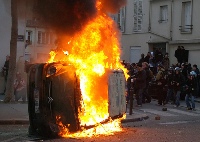France's postelection violence continues
France's postelection violence continued for a second night, leaving cars burned and store windows smashed in Paris and unrest elsewhere.

While the unrest has been small-scale, it sent a message to Nicolas Sarkozy: He may have won the presidency, but he has not won over the many French who consider him and his free-market reforms and tough line on crime and immigration frighteningly brutal.
Sarkozy, who beat Socialist Segolene Royal in a runoff Sunday, is a divisive figure whose tough language and policies have angered many on the left and in the immigrant-dominated suburban housing projects that exploded into rioting in 2005.
Some 730 cars were burned nationwide Sunday night and 592 people were arrested. The following night, 373 vehicles were torched and 160 people were taken in for questioning across France, police said.
Late Monday, several hundred people massed again at the Place de la Bastille in Paris, breaking windows in nearby shops and starting street fires. Riot officers dispersed them, police said Tuesday.
One police officer was lightly injured and eight cars and two scooters were torched, according to the Paris police headquarters. Police officials said the perpetrators appeared to be anarchists and far leftists.
In Nantes in western France, hundreds gathered again Monday night, with a few dozen hurling beer bottles and other projectiles at police. Police responded with tear gas and arrested several people. Public buildings were also damaged and minor incidents were also reported in Toulouse in southern France.
"To all those who can hear me, I ask them to immediately stop all this behavior," Socialist Party chief Francois Hollande said Tuesday on RTL radio.
"We are in a republic, where universal suffrage is the only law we know. There can be disappointment, there can be anger, there can be frustration. But the only way to react is to take up your ballots, not other weapons," he said.
Socialist candidate Royal had warned of renewed violence in case of a Sarkozy victory, and had sought to make the campaign a referendum on Sarkozy's polarizing persona.
But voters favored Sarkozy anyway, handing him a mandate for reforms that include tax cuts and new labor rules making it easier to hire and fire to revive the sluggish economy. He faces a steep challenge in carrying this out in a country that cherishes its generous social safety net.
Most of the troublemakers this week have been white, whereas the 2005 riots involved many black and Arab youth angry over discrimination and alienation from mainstream society. This week's protesters resembled some of the young people who helped bring down a minor labor reform last year through mass demonstrations.
Sarkozy's reforms promise to be tougher, and are certain to meet similar street protests.
Sarkozy himself was on a yacht in the Mediterranean on Tuesday, taking time to relax before he takes over from Jacques Chirac on May 16.
Critics on the left assailed him for his high-budget retreat the yacht belongs to prominent magnate Vincent Bollore and was outfitted with huge plasma TVs and a jacuzzi.
Hollande was more understanding. "I find it normal that after a campaign that was also difficult for him, he needs rest," Hollande said.
The Socialists and Sarkozy's UMP party are now looking ahead to parliamentary elections June 10 and 17. The UMP needs a majority to keep Sarkozy's mandate for reforms. A win by the left would bring "cohabitation" an awkward power-sharing with a leftist prime minister which would put a stop to his plans.
The Socialists, however, are in disarray, with many calling for an overhaul of a party still attached to Marxist ideas that have lost currency in an era of borderless markets.
Hollande sought to shore up his authority by insisting Tuesday that he would lead the party's legislative campaign not Royal.
Sarkozy has drawn up a whirlwind agenda for his first 100 days in office. He plans to present major reforms at a parliamentary session in July: One would make overtime pay tax-free to encourage people to work more, another would put in place tougher sentencing for repeat offenders, and a third would toughen the criteria for immigrants trying to bring their families to France.
Subscribe to Pravda.Ru Telegram channel, Facebook, RSS!


